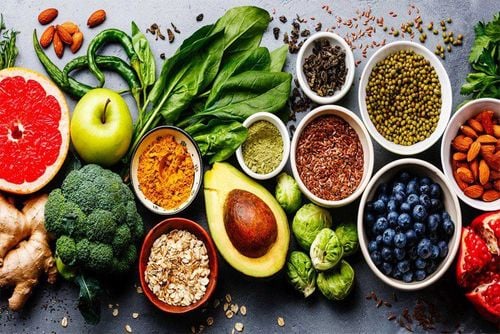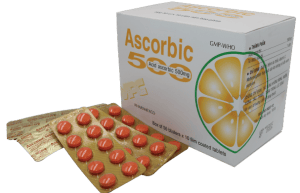This is an automatically translated article.
Sweet potato is a root vegetable that lives in the ground, rich in antioxidants, especially beta carotene. In addition, sweet potatoes are also foods that contain many nutrients that have the effect of supporting the treatment of a number of diseases.
1. Learn about sweet potatoes
Sweet potatoes are sweet and underground vegetables. It comes in a variety of sizes and colors including: orange, white, purple, and yellow. Sweet potatoes are foods rich in vitamins and minerals, antioxidants and fiber. This is also a food with extremely rich processing methods (boiled, grilled, steamed and fried).
In some parts of North America, sweet potatoes are called yams. However, these are misnomers because yams are a different type. Yams have a drier texture and more starch content than sweet potatoes. And sweet potatoes are also distantly related to common potatoes.
2. Sweet potato nutritional value composition
Sweet potatoes are an excellent source of fiber, vitamins and minerals. Nutritional composition of sweet potatoes in 100 grams of edible portion includes:
Energy: 119 Kcal Protein: 0.8 grams Lipid: 0.2 grams Glucid: 28.5 grams Fiber: 1.3 grams Vitamins: A, C, B... Minerals: Potassium, Manganese, Copper, Niacin,.. In addition, orange and purple sweet potatoes are rich in antioxidants to protect the body against free radicals. Free radicals are unstable molecules that can damage DNA and trigger inflammation. Free radical damage is linked to chronic diseases like cancer, heart disease, and aging. Therefore, using foods rich in antioxidants will be very good for health.
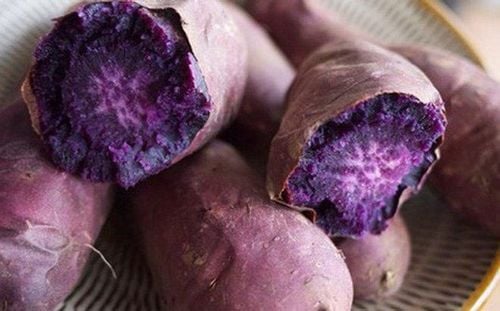
Khoai lang chứa lượng lớn chất chống oxy hoá có lợi cho người dùng
2.1. Carbs One medium sweet potato (boiled without skin) contains about 27 grams of carbs. The main ingredient is starch, which accounts for 53% of the carbs. Simple sugars, such as glucose, fructose, sucrose, and maltose make up 32% of the carbs.
Sweet potatoes have a moderate to high glycemic index, between 44 - 96. The glycemic index is a measure of how quickly blood sugar levels rise after a meal. With the relatively high glycemic index of sweet potatoes, using a large amount in the diet of people with type 2 diabetes is not appropriate. Processing also changes the glycemic index in sweet potatoes. If cooked by boiling, the glycemic index will be lower than cooking methods such as baking, frying and roasting.
2.2 Starches Starches are generally divided into three categories based on how well they are digested. The percentage of starch in sweet potatoes is divided as follows:
Fast-digesting starch (80%). This starch is quickly broken down and absorbed and raises the glycemic index. Starch digests slowly (9%). This type is broken down more slowly and causes a smaller increase in blood sugar. Resistant starch (11%). This type is eliminated by digestion and acts like fiber. It feeds the good bacteria of the gut. The amount of resistant starch can be increased by refrigerating sweet potatoes after cooking.
2.3. Fiber Cooked sweet potatoes are high in fiber. One medium sweet potato contains about 3.8 grams of fiber. Soluble fibers make up about 15 - 23% and are in the form of pectin. Insoluble fibers make up about 77-85% and are in the form of cellulose, hemicellulose, and lignin.
Soluble fibers, such as pectin, can increase satiety, reduce food intake and lower blood sugar by slowing the digestion of sugars and starches.
High amounts of insoluble fiber have been linked to health benefits, such as a reduced risk of diabetes and improved gut health.
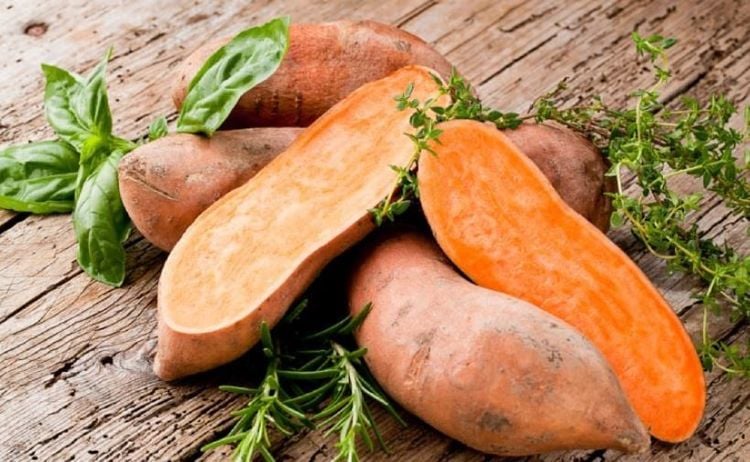
Khoai lang chứa nhiều chất xơ giúp giảm nguy cơ mắc bệnh tiểu đường
2.4 Protein One medium sweet potato contains about 2 grams of protein. This is probably the downside of sweet potato because its protein content is quite low. However, sweet potatoes contain unique proteins, which account for about 85% of the total protein content. These proteins are produced to facilitate healing whenever the plant is destroyed by physical factors. Recent research has also demonstrated that this particular protein has antioxidant properties. Although sweet potatoes are relatively low in protein, they are an important source of macronutrients.
2.5. Vitamins and Minerals Sweet potatoes are a rich source of beta carotene, vitamin C and potassium.
Provitamin A or beta carotene is abundant in sweet potatoes. This is a vitamin that the body can convert into the necessary vitamin A. Just 100 grams of sweet potatoes can provide the recommended amount of vitamin A. Vitamin C: This is an antioxidant that can reduce the duration of the common cold and improve skin health. Potassium: This is important for blood pressure control, and this mineral can also reduce the risk of heart disease. Manga: This trace mineral is important for growth, development and metabolism. Vitamin B6: This vitamin plays an important role in converting food into energy. Vitamin B5: Also known as pantothenic acid Vitamin E: A fat-soluble antioxidant that may help fight oxidative damage.
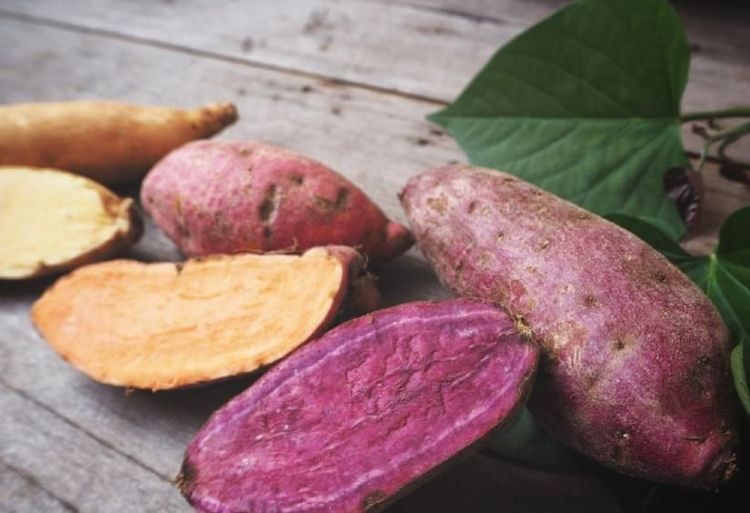
Khoai lang chứa nhiều vitamin và khoáng chất tốt cho người sử dụng
2.6. Some other compounds Like other plants, sweet potatoes also contain a number of substances that can affect health. These include:
Beta carotene: An antioxidant that the body can convert to vitamin A. It is also a fat-soluble vitamin, so adding fat to your meal with sweet potatoes will help increase absorption of the compound. this. Chlorogenic acid: This is a polyphenol antioxidant compound found in sweet potatoes. Anthocyanins: Purple sweet potatoes are rich in these compounds and are also powerful antioxidants. One thing to keep in mind is that the intensity of antioxidant activity of compounds in sweet potatoes depends on the color of the potato. Dark-colored potatoes such as purple, dark orange, and red are intensely active.
3. Some benefits of sweet potatoes in the diet
3.1. Improving insulin sensitivity in diabetes Sweet potatoes may help improve insulin sensitivity. In a 2008 study, it was found that white-skinned sweet potato extract improved insulin sensitivity in people with type 2 diabetes. Before that, in 2000 also experimented on mice with sweet potatoes with white peel or an insulin sensitizer (troglitazone) for 8 weeks. The results showed an improved level of insulin resistance in the mice given the sweet potato. However, more research is still needed to prove this benefit of sweet potatoes.
The fiber in sweet potatoes is also very important. Studies have found that people who consume a lot of fiber seem to have a lower risk of developing type 2 diabetes.
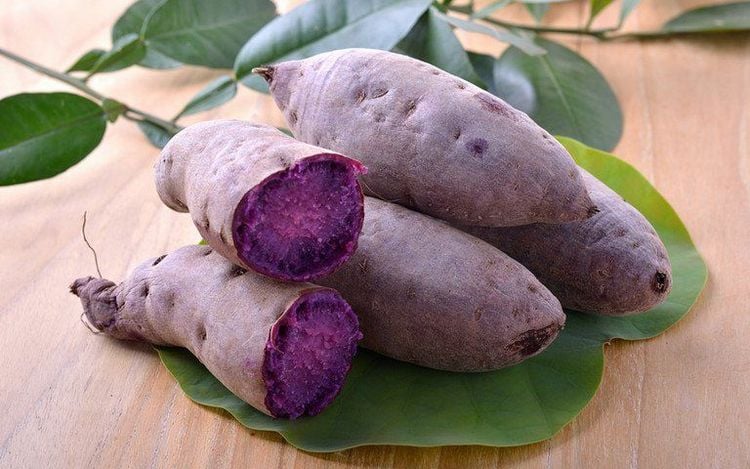
Sử dụng khoai lang giúp cải thiện độ nhạy insulin ở bệnh tiểu đường
3.2. Maintaining blood pressure The American Heart Association (AHA) encourages people to avoid foods high in added salt, and instead consume more potassium-rich foods to maintain a healthy cardiovascular system. . One serving of mashed sweet potatoes (124 grams) provides 259mg of potassium, about 5% of an adult's daily potassium requirement (4,700mg).
3.3 Reduces Cancer Risk Sweet potatoes are a great source of beta carotene. This is a type of plant pigment that acts as a powerful antioxidant in the body. At the same time, it is also a kind of provitamin A, when taken into the body, it will be converted into the necessary vitamin A.
Antioxidants can help reduce the risk of different types of cancer including prostate cancer and lung cancer. In addition, it helps prevent cell damage caused by unstable molecules (free radicals). If the level of free radicals in the body gets too high, cell damage occurs and increases the risk of several diseases.
Anthocyanins - a group of antioxidants found in purple sweet potatoes that can slow down the growth of certain types of cancer cells including bladder, colon, stomach, breast.
3.4. Improves Digestion Sweet potatoes contain two types of fiber: soluble fiber and insoluble fiber. Therefore, when fiber stays in the digestive tract, it provides many benefits for gut health. Some soluble fiber absorbs water and softens stools, so it helps prevent constipation. Soluble fiber as well as insoluble fiber can be fermented by bacteria in the colon and produce short-chain fatty acids that provide energy to the cells of the lining of the intestines and keep them healthy. Additionally, many studies link a high fiber intake to a reduced risk of colorectal cancer.
3.5. Eye protection Sweet potatoes are a source of provitamin A in the form of beta carotene. This vitamin is important for eye health. According to the ODS, one water sweet potato provides about 1,403 mcg of vitamin A or 561% of a person's daily vitamin A needs.
In addition, vitamin A also acts as an antioxidant. Along with other antioxidants it can help protect the body, preventing many diseases for the body.
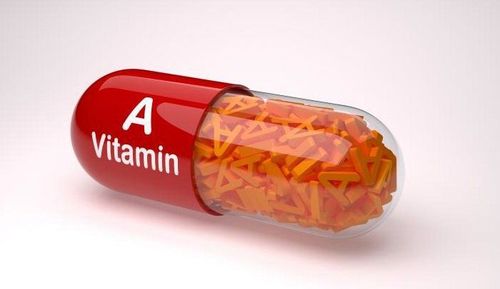
Bên trong khoai lang chứa lượng lớn vitamin A dưới dạng beta caroten
3.6. Reducing inflammation A 2017 rat study found that purple sweet potato extract may help reduce the risk of inflammation and obesity.
Sweet potatoes also contain choline - a nutrient that helps with muscle movement, learning and memory. In addition, it also works to support the nervous system.
Besides the nutritional benefits of sweet potatoes, there are also some possible health risk factors, such as: sweet potatoes contain potassium. Using high amounts of potassium will not be suitable for people who are taking beta blockers. This is a medication prescribed for heart disease. When these two are combined, the blood potassium level will increase. Or people with kidney disease also need to pay attention to the amount of potassium they consume. If they consume too much potassium can make the kidney condition worse.
Some other risks to be aware of are pesticide contamination of raw foods including sweet potatoes. To limit this, we can look to buy organic products to reduce the risk of pollution.
Vinmec International General Hospital is a hospital with the function of examination, consultation, treatment and prevention of many diseases in both children, adults and the elderly. With modern technical facilities, a team of qualified medical professionals and perfect medical services, will bring satisfaction to customers.
Customers can directly go to Vinmec Health system nationwide to visit or contact the hotline here for support.
References: healthline.com, medicalnewstoday.com




